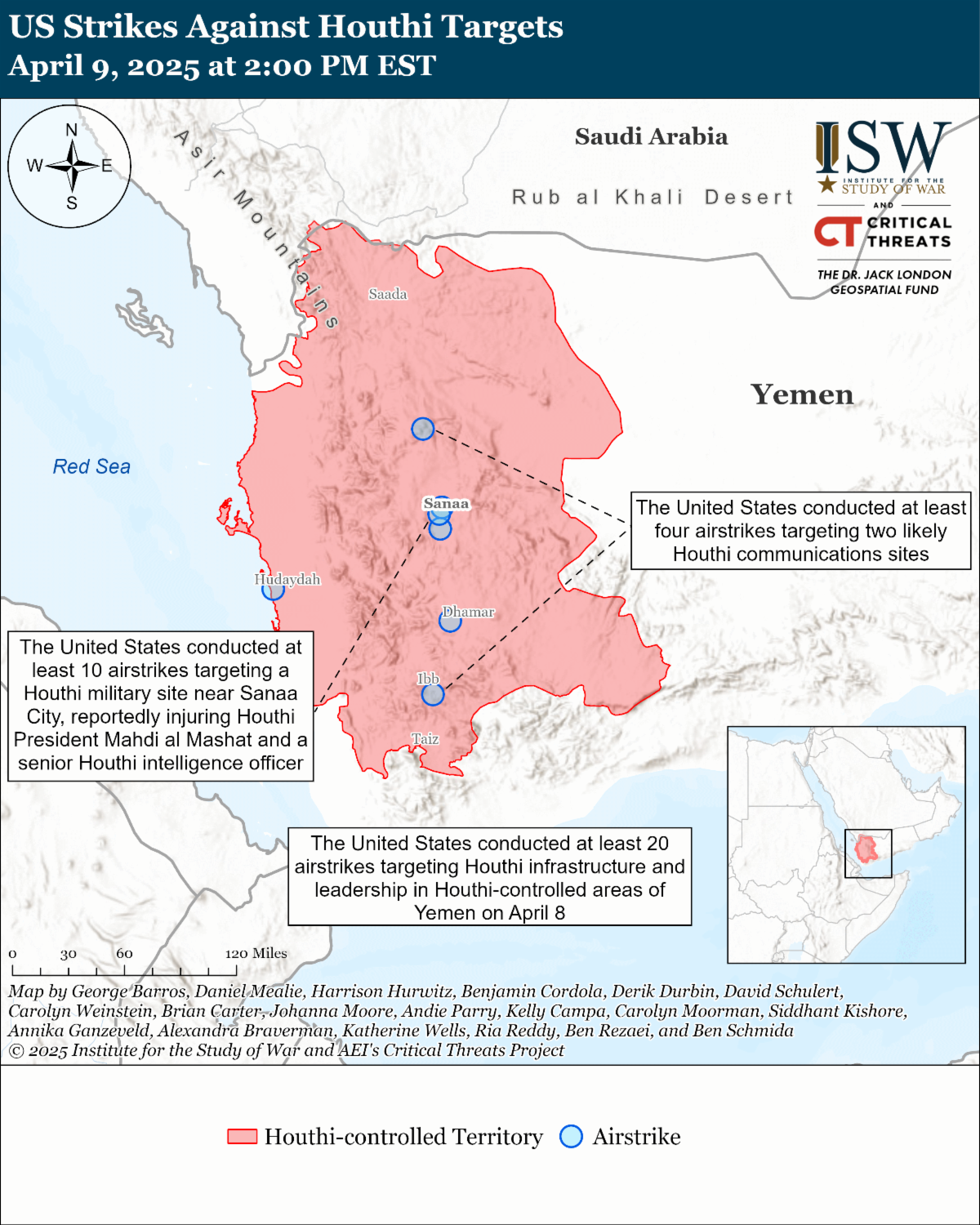US Central Command (CENTCOM) conducted at least 10 airstrikes on April 8 targeting a Houthi military base on Mount Nuqum on the eastern outskirts of Sanaa City. The strike reportedly injured Houthi President Mahdi al Mashat and a senior Houthi intelligence officer. Mashat largely serves as a figurehead in the Houthi regime, while the head of the presidential office, Ahmed Hamed, exerts control and influences decision-making behind the scenes. Hamed has close ties to Houthi Supreme Leader Abdulmalik al Houthi and fought alongside Abdulmalik in the early 2000s. Abdulmalik appointed Hamed as head of the presidential office in January 2018.
CENTCOM has conducted at least 20 airstrikes targeting Houthi infrastructure and leadership in Houthi-controlled areas of Yemen since CTP-ISW's last data cutoff on April 8. The military base that CENTCOM struck on Mount Nuqum reportedly contains underground weapons depots and tunnel networks. CENTCOM conducted at least four airstrikes in two separate sorties targeting communications sites. These sites likely support Houthi operations in Houthi territory as well as Houthi attacks in the Red Sea and against Israel. CENTCOM targeted likely Houthi barracks in Amin Muqbil on the outskirts of Hudaydah City. Airstrikes targeting communications sites and strategic points near Houthi-controlled ports will likely impede the Houthis’ logistics, including the Houthis’ ability to move military supplies and coordinate operations.
Internationally recognized Yemeni government officials argued on April 8 and 9 that a ground offensive, in addition to airstrikes, against the Houthis is the only way to eliminate the Houthi threat to international shipping. These officials called for international support for a ground offensive. CENTCOM Commander General Erik Kurilla separately met with several US defense partners and allies in the Middle East between April 1 and 5 to discuss regional developments. Kurilla held separate meetings with the Chief of Staff of the Yemeni Armed Forces, Lieutenant General Sagheer Ahmed Aziz, and the Chief of General Staff of the Saudi Arabian Armed Forces, General Fayyad bin Hamed al Ruwayli, in Riyadh between April 3 and 5. The officials likely discussed the CENTCOM airstrike campaign against the Houthis in Yemen and may have discussed cooperation with the Yemeni Armed Forces and Saudi Arabian Armed Forces to address the Houthi threat.
Key Takeaways:
- Iranian Information Operation: Iran and the Axis of Resistance are continuing to conduct an information operation targeting the West ahead of “high-level” talks between Iran and the United States on April 12. This campaign likely seeks to set conditions for Iran to argue during the negotiations that it is distancing itself from the Axis of Resistance, which is reportedly a US demand. Iran is continuing to support the Axis of Resistance despite its claims to English-language media that it is reducing support for its proxies and partners.
- Iranian Nuclear Program: Iran has continued to reject demands to fully dismantle its nuclear program. IRGC-affiliated media published an article on April 9 stating that Iran could agree to reduce its uranium enrichment but would "retain enrichment for non-weapons needs." Israeli media reported on April 9 that Israel's demands include Iran dismantling its nuclear program, halting ballistic missile production, ceasing support for the Axis of Resistance, and agreeing to a "long-term" deal.
- CENTCOM Airstrikes in Yemen: US Central Command (CENTCOM) conducted at least 10 airstrikes on April 8 targeting a Houthi military base on Mount Nuqum on the eastern outskirts of Sanaa City. The strike reportedly injured Houthi President Mahdi al Mashat and a senior Houthi intelligence officer.
- Syrian Insurgency: A Syrian businessman and former militia leader admitted on April 8 that he ordered his forces to fight the Syrian transitional government in coastal Syria in early March 2025. Jabar is the former leader of a pro-Assad militia called the Desert Falcons. Jabar fled to Russia in 2016 following disagreements with Bashar al Assad. Jabar may have admitted his role in the insurgency to perpetuate Alawite sectarian narratives that the insurgency was an act of self-defense.
| 




 [ISW] 러시아 점령 업데이트, 2025년 4월 10일
[ISW] 러시아 점령 업데이트, 2025년 4월 10일
 [ISW] 러시아의 공세 캠페인 평가, 2025년 4월 9일
[ISW] 러시아의 공세 캠페인 평가, 2025년 4월 9일